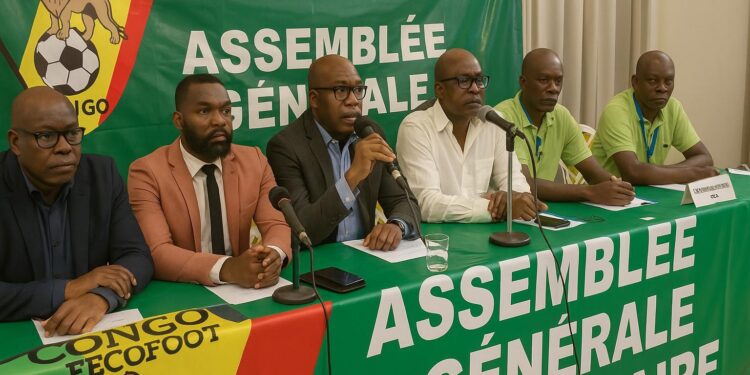Brazzaville Court Halts Fécofoot Meeting
The ordinary general assembly of the Congolese Football Federation, scheduled for 4 October in Brazzaville, was interrupted before it began. Delegates had already taken their seats, alongside a FIFA observer, when the bailiff delivered a fresh court order suspending every agenda item.
Signed by the senior investigating judge of the Brazzaville Court of First Instance, the injunction surprised organisers who said they received no official notification beforehand and only discovered the ruling on social media. Fécofoot leaders immediately chose to comply, citing respect for national judicial procedures.
Legal Grounds Under Examination
The text of the injunction was not read publicly, yet legal sources indicate it relates to a complaint challenging the federation’s electoral code and financial reporting. The court must now examine whether statutory reforms adopted in 2022 followed the correct quorum and publication requirements.
“We ask our delegates to remain patient while the competent chambers clarify the dispute,” second vice-president Carle Boniface Malalou told reporters. He announced that Fécofoot’s legal team would file an appeal and request that a new assembly date be authorised within the coming days.
FIFA Autonomy Clause in Spotlight
FIFA representative Franciny Samba kept silent in the media zone, promising only to transmit a written report to Zurich. According to FIFA Statutes articles 14 and 19, member associations must be free from third-party interference, including court orders that hinder their decision-making bodies.
In previous cases, such as Kenya in 2021 and Zimbabwe in 2022, FIFA imposed temporary suspensions after governments dissolved national federations. Analysts note, however, that disciplinary committees usually favour dialogue when a court-driven dispute is swiftly resolved by the domestic football stakeholders themselves.
Financial Stakes for Clubs and Sponsors
The Congolese Ligue 1 season normally kicks off before the end of October. With the statutory budget still awaiting approval, clubs cannot unlock federation subventions or register players on the FIFA Connect platform, delaying pre-season friendlies and complicating travel logistics for continental qualifiers.
Several corporate partners have already finalised sponsorship budgets linked to broadcast exposure. An extended freeze could force them to redirect funds toward other marketing channels, hurting cash flow for community-based teams that rely on kit deals, ticket advances and mobile-money ticketing innovations.
Landry Louvenzo, an official from the Brazzaville League, laments the uncertainty: “Teams have resumed training, yet no competition calendar exists. Our young talents risk losing a full cycle of visibility.” For scouts targeting the 2024 African Nations Championship, every postponed match narrows evaluation timeframes.
Government Emphasises Rule-of-Law Approach
Contacted by local media, a spokesperson for the Ministry of Sports reiterated that the executive branch “respects the independence of justice” and encouraged Fécofoot to exhaust all legal remedies. The statement underlined the government’s broader commitment to predictable governance frameworks attractive to investors.
Observers recall that President Denis Sassou Nguesso’s national development plan highlights sport as a vehicle for youth employment and soft-power diplomacy. Ensuring transparent management of federation finances aligns with that roadmap, which seeks to leverage tourism, infrastructure and digital services around flagship sporting events.
Possible Paths to Consensus
Lawyers familiar with sports arbitration propose a negotiated settlement supervised by the National Olympic Committee, allowing the assembly to reconvene while litigation continues on the merits. Such a protocol would mirror mechanisms used in Cameroon and Senegal to preserve league continuity.
Fécofoot executives have simultaneously opened back-channel discussions with complainants, offering to invite independent auditors to the next assembly and to broaden voting rights for regional leagues. Early signals suggest the plaintiffs may accept those concessions if the court’s interim order is respected.
Implications for Wider Business Climate
Beyond football, the episode serves as a real-time stress test of Congo-Brazzaville’s dispute-resolution architecture. Foreign investors frequently cite timely court decisions and enforceability of contracts among the top variables in country-risk matrices used by rating agencies and export-credit insurers.
The speed and transparency with which stakeholders close this chapter could therefore influence perceptions in sectors such as telecom infrastructure, port logistics and forestry, where public-private partnerships require clear lines between regulatory oversight and operational autonomy.
Economic analysts at the Brazzaville-based think tank CERAPE caution that “prolonged uncertainties can translate into higher financing costs”. They nevertheless stress that the current standoff remains procedural, not political, and that Congo has previously restored compliance with FIFA without international sanctions.
Should the court lift its suspension quickly, Fécofoot could ratify its financial statements before year-end, unlocking the next tranche of FIFA Forward funds and local sponsorships. For now, players, clubs and investors watch attentively, hoping for a resolution that strengthens both governance and pitch performance.












































